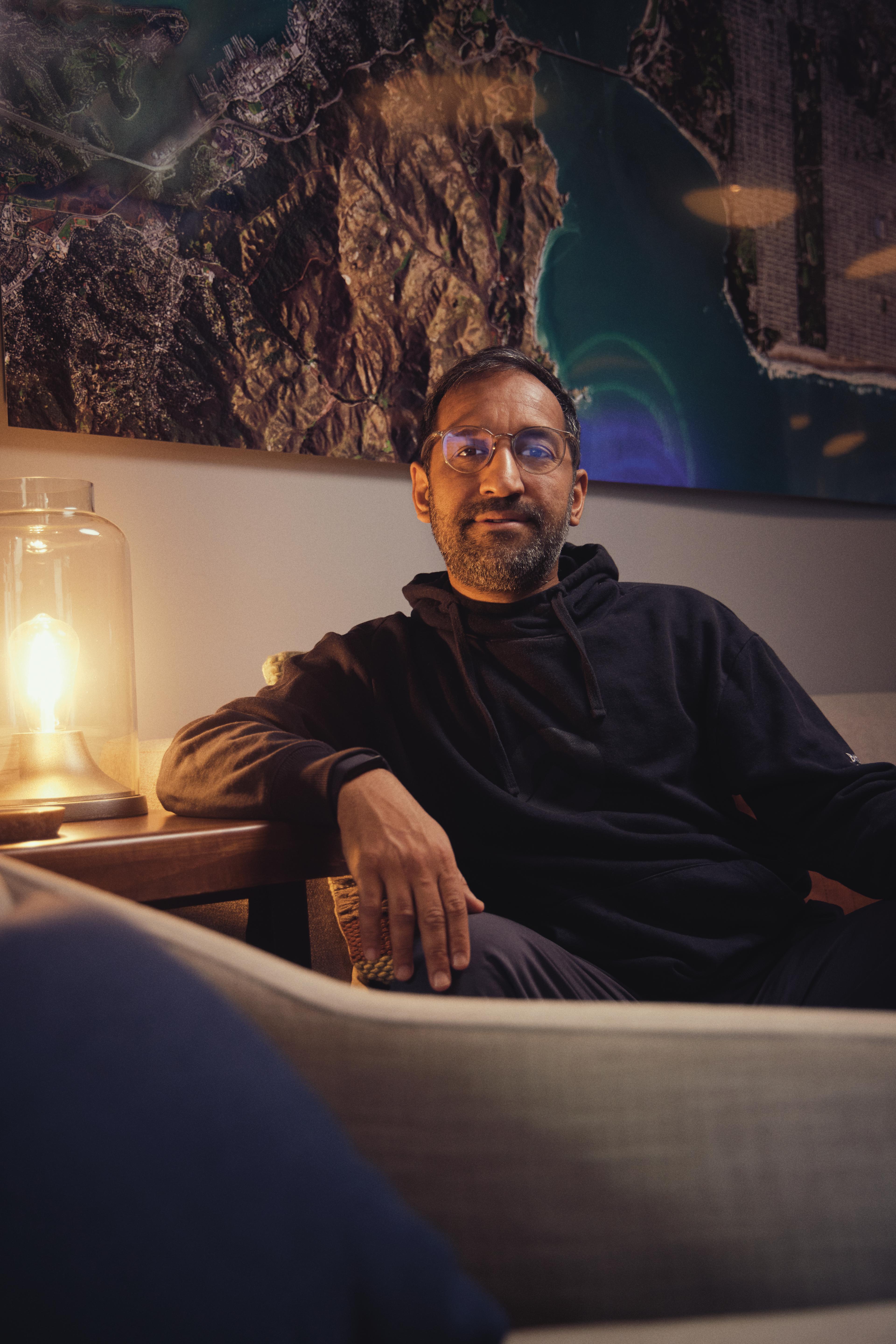Inheriting ambition, Sheel Mohnot
The VC’s thesis ladders up to his parents, who first came to the U.S. from India in 1974.
Written by Shreeda Segan
Photography by Derek Yarra
From the outside, Sheel Mohnot, co-founder and GP of Better Tomorrow Ventures, might appear like he’s got the motivations and successes of any typical well-known venture capitalist.
There’s Better Tomorrow Ventures, his early-stage fintech fund, which raised its second fund worth $225M in February 2022. There is the fact that Sheel’s name appears early on the cap tables of notable companies like Albert, Unit, Flexport, Ramp, and Kin (even Mercury). He’s big on Twitter @pitdesi, where he shares tips for early-stage founders and occasional updates on his recent wedding in the Taco Bell metaverse. Or you might see him on well-known podcasts like The Twenty Minute VC (20VC) and My First Million.
He’s even successfully helped build and sell two companies — reverse credit card auctioning platform FeeFighters (acquired by Groupon in 2012) and private auctioning site Innovative Auctions.
"So many things we do with money require human intervention but could be made much more convenient."
But Sheel tells me that these external successes are misleading — he’s not, like the common stereotype holds, pursuing VC solely for the glitz and glamor.
“Sam Altman had some post about VCs liking kitesurfing and skiing in Aspen,” he says from a plant-filled apartment in San Francisco. “That’s not really what it’s about for me. I just love getting to meet people who have cool ideas for changing the world in a small way and helping them make that a reality.”
Instead, Sheel’s thesis — that the money that circulates our world has been largely untouched by digital services, making it uneven and hard to access for most — comes from a place he says ladders all the way up to his parents, and maybe even before that.
~
Sheel’s father, Shantilal Mohnot, grew up in the ‘50s in a small village in Rajasthan, India. The family wasn’t what Shantilal would describe as rich, but Shantilal consistently topped school and state-wide exams. For college, Shantilal went to IIT Bombay, which is consistently ranked among the best schools in the country (think MIT, but even more competitive).
“After my graduation from IIT, I didn’t really care to come to the U.S.,” he remembers, “even though a lot of my classmates did. A few years later, one of them wrote to me from the States and told me ‘Shanti, because you’re a topper, they’ll give you scholarships without your having to do the GRE or even apply. Do you want to come?’ So I said yeah.”
With the help of a local community organization, Shantilal arrived in the U.S. in 1974 to pursue his master's at Kansas State University. Shantilal did well. “You’re one of the best students I have ever had,” Shantilal remembers his advisor and professor in chemical engineering, Dr. Benjamin Kyle, telling him. “You can do a Ph.D. here with me, but I want you to go to one of the best universities.”
Shantilal took his GRE and joined Carnegie Mellon University to get a doctorate in chemical engineering. By then, his life in the U.S. had drastically changed.
Firstly, he’d started to earn enough money to make a real difference in the lives of those he’d left behind. He’d bought an apartment for his brother back in India, using the money he earned from work he did one summer off from Kansas State.
“I wanted to experience America and see what people are like,” he remembers. He decided to get a job as an encyclopedia salesman, and was sent to Alabama, Mississippi, and other states along the southern belt. Soon he became one of the company’s top encyclopedia salespeople. The publishing company invited him to a celebration banquet where he received a medal from then-President Ronald Reagan.
Shantilal and Prabha with their son, Sheel.
During another winter break, when Shantilal went back to India to visit his family, he met a woman named Prabha, who would later become his wife. He got married to her within ten days, and brought her to the States within another ten days. She was only 19 years old at the time.
Prabha had left her entire family and a yet-to-be-completed degree in home economics behind. She was determined to further her own education. After poring over books on potential career paths at the local libraries, she eventually was drawn to computer science, “a new and upcoming field."
She started studying at the University of Minnesota. After just a year, Shantilal got a job in Pittsburgh. Prabha had to put a pin in her studies. It was during this period that her first child was born — a boy they decided to name Sheel.
~
The Mohnots raised Sheel with help from Shantilal’s mother. Shantilal’s company transferred him to Houston, where Prabha enrolled at Sam Houston University to finish her degree. She lived in a dorm a few days a week and worked part-time as a lab instructor in a computer science lab to pay for her education. “That was back when you had to share the mainframe computers,” she laughs.
Eventually, the family returned to Pittsburgh as Shantilal took a new job as a chemical engineering researcher at paint and supply manufacturing company PPG. Sheel considers Pittsburgh to be his home (it’s also where his first AOL screen name and current Twitter handle comes from — ‘Pittsburgh’ plus ‘desi’ equals ‘pitdesi’).
His parents — practicing Jains — wanted to instill in Sheel and his brother a love of altruism. For a while, his mother wished that Sheel would find this purpose through becoming a doctor. Sheel, of course, did not become a doctor. But he often volunteered and started organizations while at Carnegie Mellon, including the Students in Free Enterprise (SIFE) club, which he used to help senior citizens learn how to use computers.

Never miss another untold story.
Subscribe for stories, giveaways, event invites, & more.
After graduating, Sheel worked briefly as a consultant. But he soon left his job and turned down an opportunity to get an MBA from Columbia in favor of joining Indicorps, a grassroots peace corps organization in India. “It was quite a sacrifice,” his father recalls. “And he lived such a simple, ordinary life even though he had money saved from his few years of life.”
He took an assignment with the nonprofit Kiva, which enables people to fund microloans for aspiring entrepreneurs in developing countries. While working for Kiva, Sheel was paid 3,000 rupees a month — the equivalent of just under $40 today. “Taking a rickshaw was too expensive for me. I got very sick with Typhoid and, in hindsight, this is incredibly stupid, but I went to the local free hospital,” remembers Sheel.
Once, Sheel met a Kiva borrower — a rural farmer — by getting on a public bus and hitching a ride on the back of someone’s motorcycle.
“If you think about how much time that took, the cost to serve a single borrower was really high,” he says. “Now that people have smartphones in their pockets, you can use fintech to underwrite them and get them money so much faster.”
And that’s where the seeds of Sheel’s investment thesis began. “Financial services are close to 20% of global GDP,” he says. “And it’s all about numbers: any exchange of money is an exchange of a number to another account. That means it’s an inherently digital product. And yet it’s been pretty untouched by technology. So many things we do with money require human intervention but could be made much more convenient.”
Sheel’s thesis became stronger as India developed, moving quickly from an economy that relied heavily on cash to one in which digital payments are much easier to access thanks to government pushes like the United Payment Interfaces and high-growth tech companies like Paytm and Razorpay.
~
Sheel started two of his own companies to scratch a longstanding entrepreneurial itch and test some of his hypotheses on problems he felt he could solve. But, towards the end of his career as a founder, Sheel started angel investing in companies on the side and realized that helping founders directly is what he truly loves.
At Better Tomorrow Ventures, Sheel and his co-founder Jake Gibson (founder of NerdWallet) often lead seed and pre-seed rounds. Sheel uses his own experiences to figure out who to invest in. “As an immigrant or child of immigrants, you learn how to make do on a little and you have a certain work ethic and hunger for success”, says Sheel. “Even though my parents didn’t know what to do with me, they would pay for anything that would further my education, even though they were not rich.
“Because they’ve been through the struggle, or their parents have, immigrants have tended to do better. A really high percentage of entrepreneurs are immigrants. And I gravitate toward those people. And I also gravitate toward people who’ve lived abroad, like I have. We’ve invested in a company in Brazil, with a Brazilian founder, who actually moved to India to start a company. If you think that there’s an opportunity someplace else and decide to move there, that’s such a bold thing. That’s very compelling.”
Among Sheel’s bets are international companies like Indiagold, which provides instant gold loans to Indian borrowers, and Clubbi, which empowers small merchants across Brazil by optimizing their supply chains.
His parents are proud — even though he’s not a doctor. “As much as we’re impressed that Sheel is doing well in his career, we’re more impressed that he is also a good human being and tries to help people wherever needed,” says Prabha.
And as for his Taco Bell metaverse wedding? “Nobody understood what is this metaverse thing. We attended as avatars but we still don’t understand,” says Prabha.
“However, one good thing about Sheel is that he’s just not like every ordinary person,” adds Shantilal. “He’s got such a good, large circle of friends. People swarm to him and want to be in touch. And he’s always wanted to be adventurous and do different things.”
More Like This
